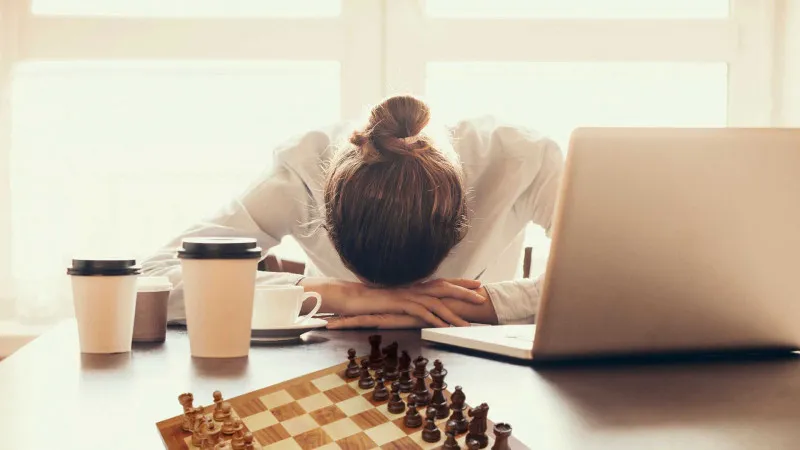Stop Playing Chess When Your Body Doesn't Want To
To win the race, listen to your car. To win at chess, listen to your body.
To win the race, listen to your car. To win at chess, listen to your body.

“Sometimes I play so well, and sometimes I play so badly” - This is one of the most common phrases I hear from chess players, over and over again.
If you’re also one of them, here you’ll find one of the main reasons why that happens and WHAT to do so that you can only play “so well” and never again “so badly”.
Recently I experienced a strange challenge as a coach.
One of my very talented students, not surprisingly for me, raised around 300 online rating points in a few months.
He didn’t raise it just by luck or because it was a good period. He really started to play very strongly. But then a strange thing happened.
He started losing points.
He dropped 50, then another 50. I thought: “Okay, that happens sometimes. He’ll get them back soon”.
...But very soon, he dropped another 100 points.
It was already a red signal, something was going wrong.
I started checking his games very carefully to understand what was happening, what was going wrong. Unfortunately, the quality of his games had dropped drastically.
But the mystery was that he was doing somewhere between super and fantastic during lessons.
It was just that when it came to playing - he was between bad and horrible.
And I couldn’t figure out what was wrong.
His mood was fine, his energy level was fine. He was keeping the rule of “9 games” and the rest of our rules.
By luck, one evening I was reading something on the Internet when I bumped into an article with a headline “Stop Working Against your Body’s Natural Rhythm”.
It was about the importance of not working when your body doesn’t want to and about natural body rhythms.
Somehow I had totally forgotten about this important topic.
I instantly took the phone and messaged him:
Me: Hey, young brother, tell me please, when do you play chess online?
Him: In the evening, coach.
Me: And when were you playing before?
Him: In the morning.
Aha… Here it is! 🙂
Because of a fight with his brother for the TV remote control and the PlayStation joystick, they’d decided to share them between different times of the day, and he started having fun in the morning and having chess fun in the evening 😀😀
The next day we changed his routine. He started playing chess and working on chess in the morning, and very soon, he got his lost rating back.
It’s very important to understand our body, its language, to “talk” to it, to “listen” to it, and not risk playing chess when it doesn’t want to, when it’s tired or experiencing a low energy period.
Most people ignore their body rhythms.
They go for a walk with a friend or turn on Netflix when their energy level is high and they play chess when their energy level is low.
Yet, they would achieve totally different results if they switched the places of these two activities.
So what is natural body rhythm? And how can you find out when your energy level is high and how you should use it correctly?
Let’s go step-by-step.
From a scientific perspective, there are two types of natural body rhythms.
Circadian rhythm defines the body’s 24-hour cycle, or in other words, it’s our biological “clock.” It influences our energy level and thus determines when we’re likely to be most and least productive during a given 24-hour cycle.
During a single circadian day (24 hours), our body goes through a series of shorter cycles. Each one lasts between 90 and 120 minutes. Our level of alertness changes during these cycles.
Have you ever wondered why you experience a mental lull after 90 minutes of focused blitz games? The lull is due to your ultradian rhythm.
And this is one of the reasons I recommend playing a session following the “golden method”.
You’ve probably noticed that you feel more alert during certain parts of the day and have lower energy at others. This pattern has to do with your “chronotype,” or personal circadian rhythm. It varies from person to person, and most of the time, people fall into one of these two groups:
If you find it easy to wake up in the morning and feel you have the most energy early in the day, you’re a morning person.
If you feel your brain works better in the evenings and you have more energy during the end of the day, you’re a night owl.
Your goal should be to identify when your energy level is at its peak and its minimum and schedule our days accordingly.
Concerning me, I know that my peak working hours are between 6 AM and 2 PM, and from 7 PM to 10 PM.
And my energy level is very low from 3 PM to 6 PM.
During that period, I never do important tasks or tasks that need creativity at my work. And also, I never go to chess.com or lichess at that time. You should figure it out, too, and stop pushing against your body.
After you do that, you’ll notice that you’ve become much more productive and that your results have risen.
How can you find out when your energy level is high and when it is low?
Most of us can feel which time of the day we are more alert, when we are sleepy and don’t want to do anything.
If you still don’t know, here are a few action steps.
Play at different times during the day.
Track your energy level and ability to focus for 1-2 weeks. Assign both aspects a value between 1 and 10. A value of 1 signifies low energy or inability to concentrate. A value of 10 signifies a high level of energy or sharp focus.
After each session, whether you play online chess or offline, grade yourself in a spreadsheet.
But be honest. If you had a session with low energy and couldn’t focus properly, give yourself a low mark. If you were feeling motivated, energized, and could easily focus during the session, don’t be shy to give yourself a high mark.
After 1-2 weeks, you’ll notice certain times during a day when you weren’t doing good.
That’s the time when you should avoid playing chess or working on chess.
The times you gave yourself high marks most probably are the best ones for chess.
Adjust your day based on this.
1. If you are not 100% sure about the accuracy of your results, continue the experiment.
The more data you have, the higher will be the accuracy.
But most probably, after 10-20 sessions, you’ll have a clear image of your body’s most and least productive time.
2. Limit the amount of caffeine and other stimulants so you can assess the results with a higher degree of accuracy. No Coca-Cola for 2 weeks! Sorry 🙂
A few days ago I was watching the movie “Ford vs Ferrari”.

Matt Damon and Christian Bale in Ford v Ferrari. 20th Century Fox
I don’t remember the exact sentence that Ken Miles said, but it was something like this:
“To win the race, you should listen to your car.”
Your body is your Ferrari (or Ford, or Bentley... any brand you love).
And you should listen to it... Otherwise, you’ll break it and stay out of the race.
P.S. When do you wake up?
What’s your daily routine?
What changes (adjustments) will you make now?
Share them in our forum.
P.P.S. Don’t forget to share it with your friends who say “Sometimes I play so well and sometimes so badly.” 😊
I’ll see you in the next article, next Tuesday, at the same time.
Originally published Jun 2, 2020

